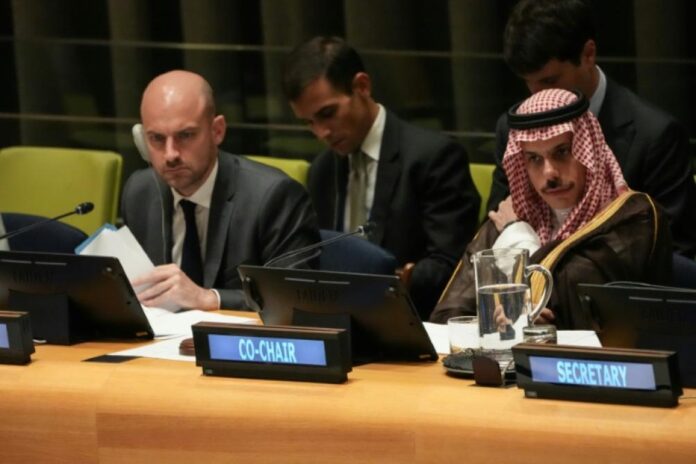A Conference Full of Statements, Empty of Leverage
The two-state solution is being dusted off once again. On Monday, July 28, during a multilateral conference at the UN headquarters in New York, representatives from France, Saudi Arabia, and several Western and Arab states issued the now-ritualistic call for the creation of a Palestinian state alongside Israel. A familiar refrain, offered amid a geopolitical context that renders such declarations more symbolic than strategic.
While Paris and Riyadh co-chaired the event with the declared goal of reviving peace talks, both Israel and the United States lambasted the initiative, calling it untimely and unproductive. In truth, this diplomatic theater seems less about realpolitik and more about reputational maintenance for Western chancelleries increasingly uncomfortable with the moral toll of the Gaza war.
The Mirage of Statehood in the Ruins of Gaza
French Foreign Minister Jean-Noël Barrot, speaking before the Assembly, claimed that the two-state solution is “dying,” while simultaneously insisting that “there is no alternative.” That contradiction alone encapsulates the incoherence of current Western diplomacy: advocating for a political resolution while refusing to confront its primary saboteur.
More than 21 months into the Gaza war, the so-called peace process exists only in the rhetorical void. On the ground, facts accumulate: continued Israeli settlement expansion in the West Bank, open calls from Israeli ministers for full annexation, and an increasingly fragmented Palestinian political leadership. Barrot’s speech, “no ceasefire will hold without a political vision”, sounded more like an admission of helplessness than a diplomatic strategy.
US and Israeli Backlash: Business as Usual
The U.S. State Department dismissed the conference as a “publicity stunt,” a telling reaction from an administration more focused on “de-escalation optics” than structural solutions. Washington, once the self-proclaimed guarantor of peace in the Middle East, now operates as little more than a fire marshal who keeps adding gasoline while warning others not to light matches.
Israel, for its part, denounced the initiative as reinforcing a “dangerous illusion.” An illusion, perhaps, but one of their own making. Since 2023, the IDF’s operations have reduced entire neighborhoods of Gaza to rubble, while the political class in Jerusalem flirts with de jure annexation of territory that international law still recognizes as occupied.
Recognition Without Leverage: Europe’s Hollow Gesture
The conference follows French President Emmanuel Macron’s announcement that France would formally recognize a Palestinian state in September, a move presented as bold diplomacy but devoid of any actual mechanism to enforce statehood. Luxembourg may follow. Others hesitate.
This symbolic recognition echoes the UN’s own 1947 resolution proposing a two-state partition, which resulted in the establishment of Israel the following year. But more than 75 years later, the envisioned Palestinian state remains a ghost. Recognition without enforcement is not diplomacy, it is performance.
Guterres’ Rhetoric and the West’s Limits
UN Secretary-General António Guterres gave a fiery speech, calling the creeping annexation of the West Bank “illegal” and the destruction of Gaza “intolerable.” Strong words, but from an institution lacking enforcement power, they amount to moral theatre.
Indeed, the conference avoided the essential questions: What leverage will be used against Israel’s violations of international law? What mechanisms will be implemented to dismantle Hamas without plunging Gaza into chaos? How will the Palestinian Authority gain legitimacy without elections or territorial control?
The Elephant in the Room: Hamas, Governance, and Normalization
Palestinian Prime Minister Mohammad Mustafa claimed the Palestinian Authority is ready to govern Gaza. His call for Hamas to surrender its weapons and control is as aspirational as it is impractical. No roadmap was offered. No timeline. Just hopeful declarations.
Meanwhile, Saudi Arabia reiterated that normalization with Israel is impossible without Palestinian statehood, a position repeated countless times since the Abraham Accords. But Riyadh remains in close security coordination with Washington and Tel Aviv, leaving many to wonder whether this statement, too, is more about domestic optics than regional rupture.
A Peace Process Reduced to Performance
This conference did not resurrect the two-state solution. It embalmed it. The diplomatic language was polished, the statements coordinated, the video clips pre-cut for social media, but none of it concealed the grim reality: the two-state solution is now a political ritual performed by those unwilling to challenge the power structures that buried it.
Until there is a cost, economic, diplomatic, or strategic, for continued occupation, no vision, no roadmap, and no number of UN podium speeches will birth a Palestinian state.



